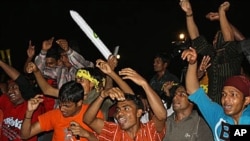Human-rights activists say the conditions for overseas laborers working in the United Arab Emirates have dramatically deteriorated since the beginning of the global financial crisis.
An annual singing competition for workers living in labor camps was held 8 Oct in Dubai, one of seven sheikdoms that make up the UAE. It came less than a month after Dubai's ruler, Sheik Mohammed Bin Rashid Al Maktoum, told Bloomberg News agency that his emirate was "back," shrugging aside any financial problems by saying a life without challenge, "would be boring."
Many overseas laborers in the UAE most likely would disagree.
The majority live in conditions that are, at best, described as challenging - doing backbreaking work for low wages, sleeping in cramped quarters, and sending nearly all of their earnings abroad to support their families.
The joint winner of this year's "Dubai Idol" - Mohsin Khan - is one of them. After being awarded a cash prize and a new TV, he said he could not wait to tell his family in India what he would be sending them. "Now I am going to tell them that I won the competition. So another TV is going to come."
But experts say happy calls home have become much less frequent since Dubai's debt woes began a little less than a year ago. Tens of thousands of workers have lost their jobs and many have been marooned in camps after economic uncertainty led their employers to flee the country.
A sponsorship system known as Kafala exists in the UAE, which makes it easy for companies to carry out illegal practices, such as confiscating workers' passports and withholding wages.
The scheme has been heavily criticized by a number of human-rights officials, including Dubai researcher Samer Muscati at Human Rights Watch. To make matters worse, he said many laborers turn to loan sharks to pay illegal recruitment fees and arrive in the UAE heavily in debt.
"Because of the layoffs and the fact that some of these workers are stranded, we are seeing an increase in suicides, where some workers feel the only way out is to kill themselves, hoping that the people who have lent them money will avoid going after their families or their houses back in India and other locations in South Asia," said Muscati. "Unfortunately, that is not the case; the creditors still go after the families even after the death of migrant workers."
Muscati blames UAE authorities for not doing enough to improve the situation in the country. "Unfortunately, it does not seem that the government is committed here to fundamentally changing the way that migrant workers are brought in and the way that migrant workers are treated, so I think it is a problem that is going to be here for a while, especially given the economic downturn. It will make reformation a bit more difficult."
Others, however, say company owners are responsible for the conditions of their employees.
Founder of Adopt-a-Camp, Saher Shaikh, points out that the UAE government is taking steady steps to protect its overseas workforce. "I do think the Dubai government has been enforcing its laws more stringently, been tougher on them [labor camp owners]. The inspections committee really seeks out knowledge of camps that are not doing well and they go and they slap them with fines, so that is a very positive step on the side of the government that they are trying to get things moving upwards."
Shaikh has been making regular visits to labor camps during the past four years. Her aim is to create hospitable living conditions for workers by holding small seminars and distributing care packages with things like hair lice shampoo and heat-rash remedies inside.
But she says her job has become much more difficult since Dubai's debt problems were announced. "I used to love my work. I still do, but it used to be heart warming. It used to be English classes for laborers, hygiene workshops and care packages' days and seeing wonderful stuff and doing wonderful stuff and the men's smiles. And now my work, more than anything else, is heartbreaking because rather than teaching men and enlightening them and expanding their horizons here, and trying to give them a good experience of Dubai, it becomes like a man who is starving. The top priority for me becomes getting him food, getting him water and seeing men in those conditions is heartbreaking," said Shaikh.
Speaking from her own experiences, Shaikh said only 20 percent of labor camps are in "excellent" condition.
An independent survey published last year showed the majority of foreign construction workers in the UAE thought their current conditions were better than the conditions in their native countries.




